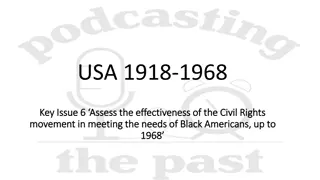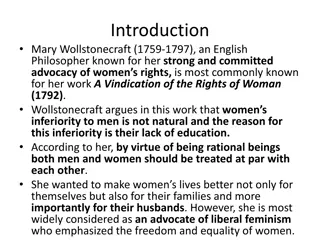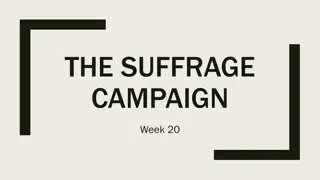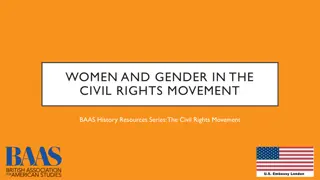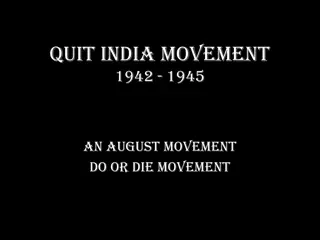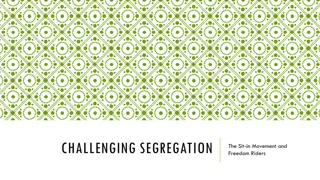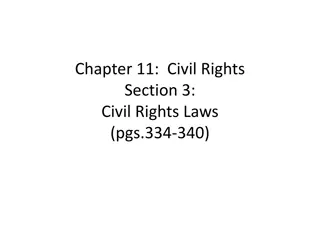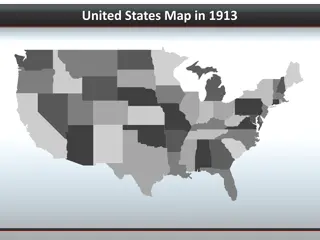Saida Menebhi: Iconic Figure in the Women's Rights Movement
Saida Menebhi, a prominent activist born in Marrakech, dedicated her life to advocating for women's rights and feminism in the MENA region. Despite facing persecution and imprisonment, Menebhi's legacy continues to inspire generations striving for gender equality. Her poignant poems and unwavering activism reflect her immense contribution to the feminist movement. Explore the life and sacrifices of this fearless icon through her powerful writings and impactful work in challenging societal norms.
Download Presentation

Please find below an Image/Link to download the presentation.
The content on the website is provided AS IS for your information and personal use only. It may not be sold, licensed, or shared on other websites without obtaining consent from the author.If you encounter any issues during the download, it is possible that the publisher has removed the file from their server.
You are allowed to download the files provided on this website for personal or commercial use, subject to the condition that they are used lawfully. All files are the property of their respective owners.
The content on the website is provided AS IS for your information and personal use only. It may not be sold, licensed, or shared on other websites without obtaining consent from the author.
E N D
Presentation Transcript
SAIDA MENEBHI A Poetic Discourse on Women's Rights Fadoua Loudiy, Ph.D. Slippery Rock University, USA
Saida Menebhi: A short biography of an icon Menebhi s Work: Activism and Writings (Poems, Letters, Interviews and unfinished article on prostitution) Overview Menebhi s Legacy for Women s Rights and Feminism in the MENA region and beyond
Saida Menebhi The Biography of an Icon Born in 1952, Marrakech At 15, in high school, she joins the National Union of High Schoolers (Le Syndicat National des Lyc ens), a clandestine organization prohibited by King Hassan II. Saida organized meetings in her sister s hair salon. In 1971, she joins the United Front of Progressist Students, known as the Front. In 1972, she is elected as a congress member to the UNEM congress, which she joins and participates in the long strikes organized by the student movement. She joins the organization A which becomes Ila Al Amam -1972-1975 : She leaves the University to become a high school teacher of English pour suivre une formation d enseignante de deux ann es. 1975: She becomes a HS teacher. January 1976 : She is kidnapped from her home by four police members. December 1977: She dies because of state neglect (after a 35 day hunger strike) The icon of the feminist movement and women political prisoners is Saida Menebehi, the martyr, who died in prison because of hunger strike Aziza Brigui, Testimonies that Matter: On Writing Torture in Morocco
January 1976 At exactly 6 PM Two terrifying dragons Two policemen The political police Blurred the waters of my ocean In my house, and yours The walls turned pale with hatred Hatred for all the fascists Poem 1 Things have hearts too The dark dragons Inflicted so much pain On the chair The one on which we sat So many times Do you remember? You called me ma belle And we started our days Reading the newspaper This poem, like many others, is addressed to Aziz Laarich, my boyfriend. He was living secretly in my house, until the day he was arrested. Aziz, whom I affectionately called Azzouz, was sentenced to 30 years of jail at the Casablanca Trial.
20 October 1976 The wind of my country Blows, hows, growls On the humid soil it sweeps The wind draws figures Engraves a past Mine, yours, that of everyone Its sound reminds me of a symphony The one you use to whisper in my ear every night A long time ago Today, this evening, tonight Only life s fingerprints Come back to my mind And the tenacious rain, the stubborn wind Come back every year Bring me back to you As far as you are They remind me again That i have a body that I have a voice Which are my gift to you. Poem 2
12 November 1976 I want to break my silence I want to humanize my loneliness They put me at loose ends So that my thinking would rust And my mind would freeze but you, whom I cherish, know Poem 3 That like a volcano that is alive I am all fire To burn the heavy doors I am all strength To break the evil locks And run to you Jump into your arms.
Saidas poetry details her kidnapping and the violence she was subjected to. It describes her kidnappers and jailers as monsters, without an ounce of compassion. Saida s poetic discourse is a powerful testimony that provides a women s perspective on state violence and incarceration. Her poetic testimony debunks the myth that Arab women are powerless and weak. Saida, along with many other women, were instrumental in the struggle to change the political regime in Morocco. Saida s poetry is a response to the patriarchal order in Morocco, which tries to silence and repress women in the name of tradition, religion or political order. Saida s poetry, especially the poems dedicated to her lover and her family (her nieces and nephews) are full of passion and love. They reveal a woman for whom love is the engine for her struggle and the end goal of her activism. Saida interviewed sex workers in prison to denounce her conditions and the reasons behind their incarceration. Their struggle is also hers. Saida Menebhi s Poetic Discourse
Saida Menebhi is an icon in the feminist struggle in Morocco and North Africa. Saida legacy continues with her work being studied and analyzed as well as her name and photos being highlighted in demonstrations (especially during the revolts of the Arab Spring). Conclusion Saida Menebhi s Legacy Her poetry and carceral writings are representative of the struggle for human rights as well as women s rights. Her strength and courage have inspired her prison mates and continue to inspire generations.



